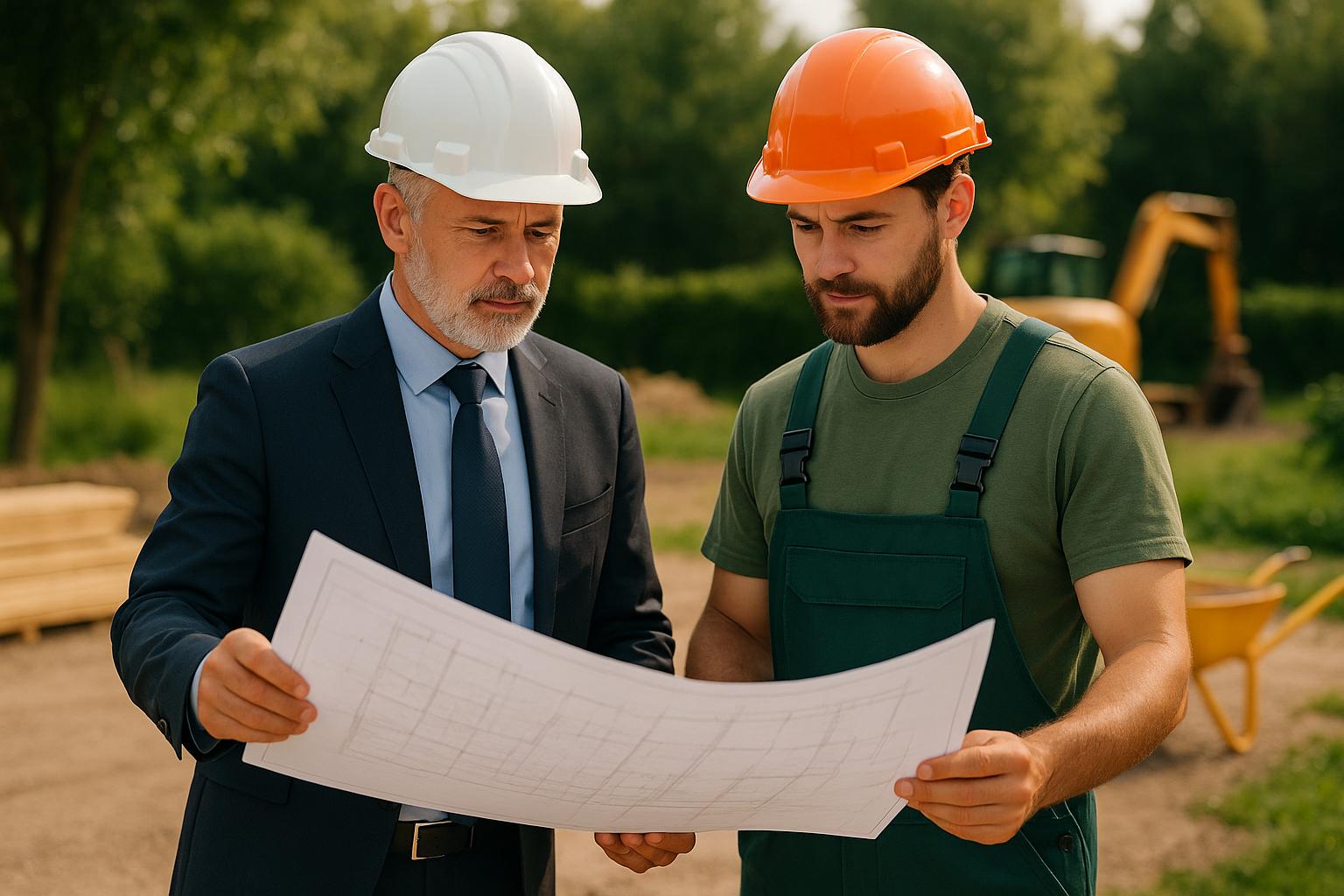- bhavya gada
- No Comments
The Maryland Responsible Personnel Certification (RPC) is a state-mandated training program required for supervisors in construction and landscaping projects involving land disturbance. Managed by the Maryland Department of the Environment (MDE), this certification ensures personnel are equipped with the knowledge to implement erosion and sediment control measures that protect local water resources.
Key Points:
- Who Needs It: Supervisors like foremen, superintendents, and project engineers overseeing land alteration activities.
- Project Types: Required for projects disturbing more than 5,000 square feet of land or moving over 100 cubic yards of soil. Sensitive areas, such as those near critical water zones, also trigger this requirement.
- Certification Process:
- Complete MDE’s free online training covering erosion control techniques.
- Pass an exam to receive certification, valid for three years.
- Renewal: Automatically renewed unless MDE requests additional training.
This certification is essential for compliance with Maryland’s erosion control regulations and helps avoid penalties, delays, or remediation costs. It also supports maintaining high standards in construction and landscaping projects.
MDE Guidance For Protecting Stormwater Best Management Practices During Construction November 2023
Who Needs Maryland Responsible Personnel Certification?
Maryland’s regulations outline specific guidelines on who must meet Responsible Personnel Certification (RPC) requirements. These details are essential for construction and landscaping companies to identify when certification is necessary and who on their team should obtain it.
Who Qualifies as Responsible Personnel
According to Maryland’s environmental regulations, "responsible personnel" refers to individuals holding supervisory roles on construction projects that involve land alteration [4][5]. This includes foremen, superintendents, and project engineers working on eligible projects [4][5]. These roles typically involve overseeing on-site clearing, grading activities, or managing erosion and sediment control plans [4][5].
At Pro Landscapes MD, project managers assigned to tasks like hardscaping, drainage, or land grading in central Maryland are required to have RPC. Certification ensures these supervisors are equipped to implement proper methods to prevent soil erosion during projects such as patio installations, retaining wall construction, or stormwater management systems.
The good news? Applying for certification is free [1], making it easy for businesses to ensure compliance without added financial strain.
Projects That Require Certification
RPC is mandatory for construction and landscaping projects that disturb the land and require an approved erosion and sediment control plan [6][2]. Typically, this includes projects that disturb more than 5,000 square feet of land or involve moving over 100 cubic yards of earth through cutting or filling [6][2].
Certain projects in sensitive areas automatically trigger RPC requirements. For example, grading activities in areas near critical water or habitat zones require certified personnel [6][2].
Tree removal projects can also fall under these rules. If the project involves removing multiple trees with a combined diameter at breast height of 60 inches or more on residential lots, RPC compliance is required [6][2].
For landscaping professionals, this means large-scale hardscaping projects, comprehensive drainage installations, or significant land grading efforts will likely need certified personnel. For instance, building expansive paver driveways, complex retaining wall systems, or stormwater management solutions will require planning for RPC certification early in the project timeline.
Once obtained, the Responsible Personnel certification remains valid for three years and is automatically renewed unless the Maryland Department of the Environment requests additional training [4][1].
Next, we’ll explore a simple, efficient way to get your certification.
How to Get Maryland Responsible Personnel Certification
Obtaining your Maryland Responsible Personnel Certification is a simple and free process. The Maryland Department of the Environment (MDE) oversees this certification, which is required for construction and landscaping professionals to meet state erosion and sediment control standards.
Certification Process Steps
The certification process includes two key steps: completing an MDE-approved training course and passing an exam.
First, enroll in the MDE’s erosion and sediment control training course (previously known as the "Green Card" certification)[3]. This course is available online, allowing you to complete it at your own pace. It covers Maryland’s erosion and sediment control program, focusing on its importance in protecting local water resources and the Chesapeake Bay. You’ll also learn practical strategies for maintaining effective erosion controls. This training is mandatory for anyone designated as the "Responsible Person" on construction or landscaping projects. For more details, you can refer to the Charles Soil Conservation District[3].
Once you finish the training, you’ll need to pass an exam that tests your understanding of Maryland’s erosion control regulations and best practices[1].
Required Fees and Documents
One of the best parts? The certification process is completely free – there’s no application fee for the Erosion/Sediment Control Responsible Person Certification[1].
To apply, you’ll fill out an online form through the Maryland Department of the Environment. This form requires basic professional information and confirmation that you’ve completed the required training course[1]. Since the entire process is digital, there’s no need to mail documents or visit an office in person. This streamlined approach is especially helpful for businesses like Pro Landscapes MD, which depend on efficient certification processes to keep their projects running smoothly.
After submitting your application and passing the exam, the MDE will process your certification, so you can quickly get back to focusing on your work.
sbb-itb-843f8be
Keeping Your Certification Current
Maintaining your certification is key to adhering to Maryland’s erosion and sediment control standards. The Maryland Responsible Personnel Certification is designed to renew automatically, ensuring you stay compliant without interruption.
Renewal Timeline and Requirements
Each certification is valid for three years from the date it’s issued and will renew automatically unless the Maryland Department of the Environment (MDE) requires additional training. To ensure a smooth renewal process, keep your contact information up to date with the MDE so you don’t miss any important notifications. While the renewal is generally automatic, you should stay informed about any extra training the MDE might require.
Staying Prepared for Additional Training
Although there are no routine continuing education requirements tied to each renewal period, the MDE has the authority to require further training if necessary [1]. If this happens, the MDE will provide you with all the details, including deadlines and specific training requirements. Make sure your contact information is current so you can quickly receive any updates or instructions.
Working with Certified Professionals
When planning landscaping or hardscaping projects in Maryland, it’s important to hire companies with certified professionals. These experts ensure projects meet environmental standards while delivering high-quality results.
RPC Compliance in Landscaping Work
Certified professionals play a key role in ensuring compliance with regulations by using precise erosion control techniques. They focus on stormwater management and erosion prevention during tasks like grading, installing retaining walls, and setting up drainage systems. By carefully managing soil disturbance and sequencing construction activities, they protect the environment while keeping projects on track.
Their expertise helps avoid environmental complications and improves overall project efficiency. For example, they can identify potential erosion risks early – critical for projects that involve grading, land leveling, or drainage installation, where soil disruption is unavoidable.
Benefits of Hiring Certified Service Providers
Hiring certified professionals offers more than just regulatory compliance – it can simplify your project and deliver better results. These experts integrate environmental safeguards into their work from the start, minimizing delays and ensuring all documentation aligns with regulatory requirements.
Companies like Pro Landscapes MD, which employs certified professionals, showcase their dedication to environmental responsibility and high professional standards. Serving areas such as Howard County, Montgomery County, Carroll County, Frederick County, Prince George’s County, and Baltimore County, they ensure projects meet Maryland’s environmental guidelines while achieving outstanding results.
Certified professionals bring a deep understanding of how various materials and installation methods impact environmental compliance. Whether you’re planning paver installations, French drain systems, or comprehensive stormwater management solutions, they can recommend approaches that align with both your aesthetic preferences and environmental needs.
Conclusion
Maryland’s Responsible Personnel Certification stands as a key element in ensuring construction and landscaping projects meet regulatory standards while reducing their environmental footprint. This program helps property owners navigate the often-complicated web of regulations, making it easier to create projects that are both compliant and environmentally conscious.
Certified professionals play a crucial role by embedding regulatory requirements and environmental safeguards into the planning and execution phases of a project. This proactive approach not only avoids costly compliance setbacks but also keeps projects running smoothly and on time.
Pro Landscapes MD exemplifies this commitment through a team of certified professionals who prioritize responsible practices in every landscaping, hardscaping, and drainage project they undertake across central Maryland. Their dedication ensures high-quality results while adhering to all necessary regulations.
FAQs
Who needs to obtain the Maryland Responsible Personnel Certification for construction and landscaping projects?
The Maryland Responsible Personnel Certification is mandatory for professionals managing tasks like sediment control, clearing, grading, or soil erosion on construction and landscaping sites. This certification often applies to roles such as foremen, superintendents, and project engineers.
Its purpose is to ensure these professionals have the expertise needed to handle environmental compliance and follow best practices during site operations. This certification plays a key role in safeguarding Maryland’s natural resources while meeting regulatory requirements.
How is the Maryland Responsible Personnel Certification automatically renewed, and what should I do if I need additional training?
The Maryland Responsible Personnel Certification remains valid for three years and usually renews on its own. However, if the Maryland Department of the Environment decides that further training is needed, they will inform you directly. If this happens, you’ll be required to complete the specified training or courses to keep your certification active. To ensure you don’t miss any important notifications, double-check that your contact details are current.
What are the environmental advantages of hiring certified landscaping and construction professionals in Maryland?
Hiring certified professionals for landscaping and construction projects in Maryland offers a range of benefits for the environment. These specialists are skilled in applying sustainable techniques such as stormwater management, conserving water, and incorporating native plants thoughtfully. By cutting down on runoff and reducing pollution, they play a vital role in safeguarding local ecosystems and keeping waterways, like the Chesapeake Bay, healthier.
These professionals can also craft environmentally friendly landscapes that boost soil quality, encourage biodiversity, and transform outdoor spaces into areas that are both practical and environmentally conscious. Their knowledge ensures that your project not only preserves the natural charm of your property but also supports long-term environmental health.


















Chat with Us